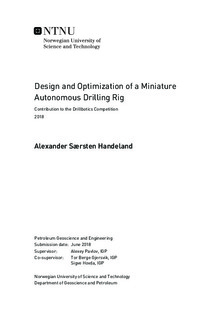Design and Optimization of a Miniature Autonomous Drilling Rig - Contribution to the Drillbotics Competition 2018
Master thesis
Permanent lenke
http://hdl.handle.net/11250/2559474Utgivelsesdato
2018Metadata
Vis full innførselSamlinger
Sammendrag
Drillbotics is an international drilling competition hosted by DSATS for the fourth consecutive year, arranged to accelerate advancement in drilling automation. NTNU was one of nine universities that based on a design report got accepted to the 2018 finals. This report will portray NTNU's Phase II contribution to the competition, including design calculations, technical considerations and key findings, as well as describing the competition day.
A report was made for Phase I of the competition which serves as a foundation to the work done in this release. The changes introduced in Phase I are implemented on the rig and described here, in addition to several new ideas. The miniature rig has been improved through four different design focuses: safety, performance & reliability, simplicity and digitalization.
By adding an acrylic plexiglass to surround the drill pipe and pump shaft, drilling HSE has been improved. A semi-closed system was implemented on the rig's circulation system, removing water from the rig floor, and separating it further from the electronics.
Through designing a non-aggressive bit, the miniature rig was able to drill with increased weight at lower torque, shielding the drill pipe from twist-off while increasing ROP. Stiffness of the rig was improved by the addition of structural support to the rig framework as well as a cylindrical load cell. Together with a new ball screw, this resulted in reduced drilling vibrations while improving control responsiveness. A low-wear bearing was implemented to reduce damage on the drill pipe, while a universal coupling was added below the top drive to absorb vibrations stemming from misalignment.
The rig design has been simplified. With a newly designed downhole sensor card solution, four components were removed from the stabilizer in the BHA while maintaining hydraulic integrity. An automatic balancing unit sub has been proposed and tested, however proved to be under-dimensioned and failed during testing. A shorter stabilizer design was incorporated, reducing BHA weight and the pipe's tendency to twist-off, by reducing the difference in torsional inertia between drill pipe and BHA.
A framework for digitalization has been established. This includes fit-for-purpose software in a transition from MATLAB SimuLink to NI LabVIEW, and data lake-access of automatic well reporting. An improved GUI design was implemented, improving QoL for the driller. Additional sensors are added, including downhole accelerometer and gyroscope, and a topside ultra-sonic intelligent sensor unit, for formation boundary analysis. The control system may now run two different scripts: a competition script designated to performance in the Drillbotics competition, and a full autonomous script. The autonomous script can detect and estimating drilled formation from a selection of different rock and optimize drilling accordingly.
The Drillbotics 2018 competition day was held on June 4th. The NTNU rig was successfully able to drill through the entirety of the competition rock, with total drilling time of 195 seconds. The competition rock included a variety of formations of different hardness, and a detrimental 45 degrees inclination. The rig proved its ability by drilling without any dysfunctions, showcasing smooth layer transition through integrator reset and ability to handle over-torqueing. Utilizing a best-fit compromise PID tuning allowed the rig to handle both soft sandstone as well as a hard section of flatstone.
